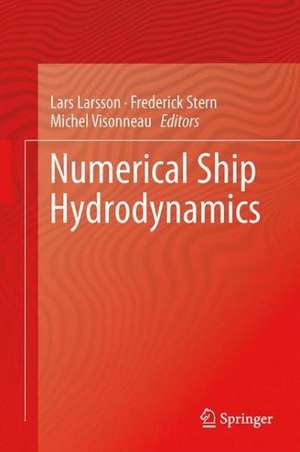Numerical Ship Hydrodynamics: An assessment of the Gothenburg 2010 Workshop
Editat de Lars Larsson, Frederick Stern, Michel Visonneauen Limba Engleză Hardback – 10 oct 2013
| Toate formatele și edițiile | Preț | Express |
|---|---|---|
| Paperback (1) | 786.65 lei 38-44 zile | |
| SPRINGER NETHERLANDS – 27 aug 2016 | 786.65 lei 38-44 zile | |
| Hardback (1) | 952.26 lei 43-57 zile | |
| SPRINGER NETHERLANDS – 10 oct 2013 | 952.26 lei 43-57 zile |
Preț: 952.26 lei
Preț vechi: 1161.29 lei
-18% Nou
Puncte Express: 1428
Preț estimativ în valută:
182.22€ • 190.73$ • 151.66£
182.22€ • 190.73$ • 151.66£
Carte tipărită la comandă
Livrare economică 31 martie-14 aprilie
Preluare comenzi: 021 569.72.76
Specificații
ISBN-13: 9789400771888
ISBN-10: 9400771886
Pagini: 330
Ilustrații: IX, 318 p. 170 illus., 20 illus. in color.
Dimensiuni: 155 x 235 x 20 mm
Greutate: 0.64 kg
Ediția:2014
Editura: SPRINGER NETHERLANDS
Colecția Springer
Locul publicării:Dordrecht, Netherlands
ISBN-10: 9400771886
Pagini: 330
Ilustrații: IX, 318 p. 170 illus., 20 illus. in color.
Dimensiuni: 155 x 235 x 20 mm
Greutate: 0.64 kg
Ediția:2014
Editura: SPRINGER NETHERLANDS
Colecția Springer
Locul publicării:Dordrecht, Netherlands
Public țintă
ResearchCuprins
1 Introduction, Conclusions and Recommendations.- 2 Evaluation of Resistance, Sinkage and Trim, Self-Propulsion and Wave Pattern Predictions.- 3 Evaluation of Local Flow Predictions.- 4 Evaluation of Seakeeping Predictions.- 5 A Verification and Validation Study Based on Resistance.- 6 Additional Data for Resistance, Sinkage and Trim.- 7 Post Workshop Computations and Analysis for KVLCC2 and 5415.
Textul de pe ultima copertă
This book assesses the state-of-the-art in computational fluid dynamics (CFD) applied to ship hydrodynamics and provides guidelines for the future developments in the field based on the Gothenburg 2010 Workshop. It presents ship hull test cases, experimental data and submitted computational methods, conditions, grids and results. Analysis is made of errors for global (resistance, sinkage and trim and self-propulsion) and local flow (wave elevations and mean velocities and turbulence) variables, including standard deviations for global variables and propeller modeling for self-propulsion. The effects of grid size and turbulence models are evaluated for both global and local flow variables. Detailed analysis is made of turbulence modeling capabilities for capturing local flow physics. Errors are also analyzed for head-wave seakeeping and forward speed diffraction, and calm-water forward speed-roll decay. Resistance submissions are used to evaluate the error and uncertainty by means of a systematic verification and validation (V&V) study along with statistical investigations. Post-workshop experimental and computational studies are conducted and analyzed for evaluation of facility biases and to draw more concrete conclusions regarding the most reliable turbulence model, appropriate numerical methods and grid resolution requirements, respectively.
Caracteristici
Provides a thorough assessment of the state-of-the-art of CFD in Ship Hydrodynamics First book on this topic Concrete, numerical values of attainable accuracy for all types of predictions are presented Formal uncertainty assessment has never been applied to such a large body of real industrial cases before Includes supplementary material: sn.pub/extras








